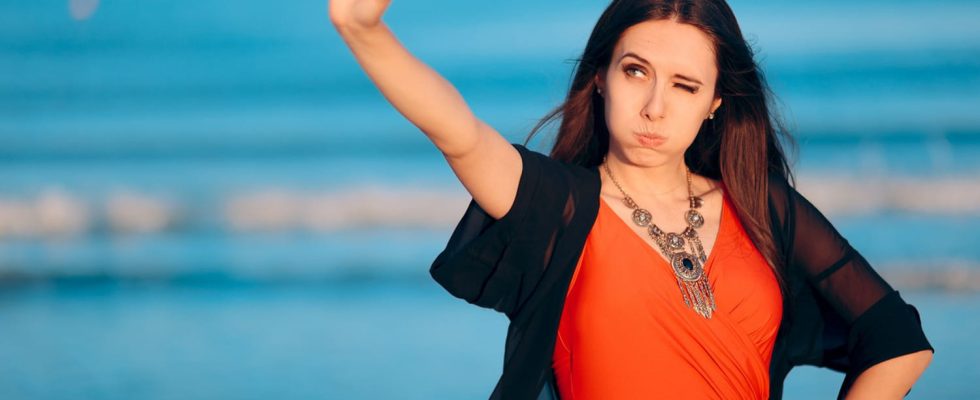Popularized with social networks, the selfie allows you to present yourself in your most flattering light, including your weight! A study showed how a simple photo could make us lose weight. And that’s far from being a good thing!
Arch your back, tuck your stomach, squeeze your buttocks, tilt your head slightly and, above all, smile! You are now ready to post your umpteenth selfie on your social networks! And, whenever possible, a flattering selfie. Normal: since the advent of cameras, we generally try to highlight ourselves in photos, to immortalize a good moment. And this natural trend has increased in recent years with the popularity of selfies – these modern self-portraits – and social networks. For some, appearing thin in photos makes them feel beautiful, especially in an age where appearance is increasingly important and we spend our time exposing ourselves to others, including with the famous selfies – even if it means “cheating” a little. And for that, the angle of the photo plays an important role, without necessarily needing to use tons of filters on the shot. A study published on October 11 in the scientific journal PLOS One reveals that women can appear thinner in selfies than in photos taken from other angles. And this is not without consequences…
How the camera angle deceives our gaze
Ruth Knight and Catherine Preston, respectively professor and lecturer in psychology at Saint John’s University in York (United Kingdom), carried out a little experiment. They asked ten female models to dress in tight sportswear and take photos of themselves, or have their photos taken in different ways. Were taken for each participant:
- A selfie where she extends her arm;
- A photo taken by someone else;
- A self-portrait with chin down.
- A selfie where she uses a selfie stick;
Faces were excluded from the images, with focus placed solely on the appearance of bodies from different angles. The researchers then asked adult women, aged 18 or older and with no history of eating disorders, to rate the weight and attractiveness of the models in the different photos. Result: participants tended to judge the bodies in the selfie images to be thinner than the bodies in the images taken by an outsider. Of the three angles of the selfie/self-portrait, the one with the chin down was judged less beautiful – showing that you have to keep your head up! Moral: we appear thinner in our photos than in those taken by our friends!
But that is not the conclusion of the story. “Many of us see selfies every day while scrolling through the growing number of social media platforms”explain the authors of the study. “This research suggests that the angle from which the photo is taken can change our judgment of body size. When we consume images on the Internet, even simple unfiltered selfies, what we see is not necessarily a representation accurate to real life.” However, data suggests that looking at selfies may be more harmful than other photos for people vulnerable to eating disorders.
Indeed, participants who presented, through a previously completed questionnaire, more symptoms of eating disorders tended to have a more favorable opinion of the selfies presented compared to the other photos. “Given the rise in body image issues and eating disorders, it is essential to understand the impact of social media on body image”explains Dr Ruth Knight. “One of the unique things about social media is that it allows us to take photos of ourselves and then upload them to be seen by a large network of people. The awareness of how we Judging images can help mitigate the negative effects on body satisfaction, dieting, and the risk of eating disorders.” Of course, the study is not without its flaws, if only due to its limited panel of participants. But this is one more example that social media provides us with rather unrealistic images of the body. And this adds to the mental pressure placed on many people, especially young girls, who seek to portray the best image of themselves.
